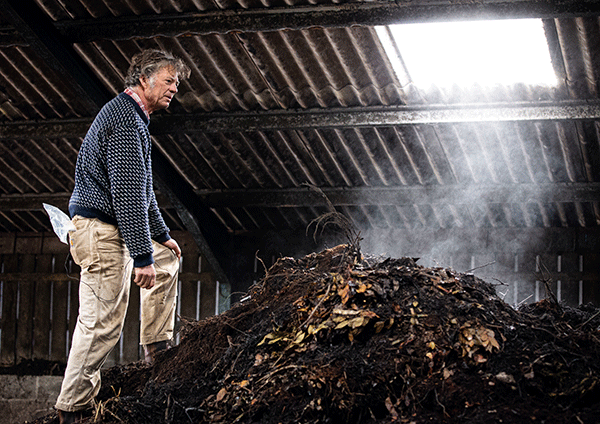The transition is complete, and our fruit and veg packaging (bags, punnets, nets) is now home compostable, where packaging is needed at all.
We have always used minimal plastic (in 2020, our veg boxes used 82 per cent less plastic than supermarket organic veg), but we do need some plastic-like materials to retain moisture and so prevent food waste. Unlike ‘degradable’ plastics (which are often a source of long-term microplastic pollution) or even some ‘compostable’ plastics (which may require the high temperatures of industrial composters to break down), our home compostable materials biodegrade completely into CO2, water and organic matter within a year, even at low temperatures.
Arguably, recyclable could be a better option – but depressingly, only around seven per cent of plastic bags are actually recycled, and there seems little hope of change to our disjointed national recycling system any time soon. According to our survey, a staggering 82.5 per cent of our customers compost at home, which is why we chose this route.
If you’re a composter, just add the packaging to your home compost heap, or your compost bin if your local authority accepts it. If not, you can leave it out with your veg box. We will compost it, along with our veg waste and wood chips, to feed next year’s crops. Please don’t add it to your general waste, or worse, your plastic recycling – this is our biggest worry, as it would degrade the recycled plastic.

The bags are made from sustainably managed wood, non-GM corn and sugarcane. It has been a long journey to develop and test the material; in the end, we could not get the properties needed to prevent food waste without including a small amount of oil-based material, but this does not stop it from composting.
The end result costs four times more than conventional plastic, but we expect that prices will come down as more people adopt the materials (as with solar panels), and until then we will absorb the cost. Until recently, I might have argued that the money would be better spent on more solar panels, or a windmill, which directly address climate change – but such cold logic does not always lead the right way.
Plastic has become so iconic in a collective determination to address environmental issues that we had to act. In total, this change will save 21 tonnes of plastic a year.















This is great, could you let me know the manufacturer please as I would like to source some similar bags. As you say, you expect that prices will come down as more people adopt the materials.
Thanks
Hi cyclingsarah – Riverford worked with 2 companies to develop their home compostable packs. Tipa Corp – https://tipa-corp.com/ and Parkside Flex – https://www.parksideflex.com/compostable-packaging/ Hope that helps and you are able to make the switch too.
Thanks
As you say great. I am sure that a lot of thought has gone into this and you have come up with the best option for now. Thanks for helping me.
Can I suggest you use these new bags with spring greens, please, or leave them out of zero packaging boxes? I had to get the zero packaging box this week (all others sold out) and spring greens were one of the items, but they can’t really survive with zero packaging – I had to dispose of about half the leaves the next day (if I had known they were that fragile I would have put them into a plastic bag, which would have defeated the purpose…). It’s great you have these compostable bags!
This is great news! Is the corn, sugarcane, oil in the packaging organic? My veg plot is organic so I only compost material that has been grown in an organic way. Probably a silly question as Riverford is organic but just wanted to check. Thanks